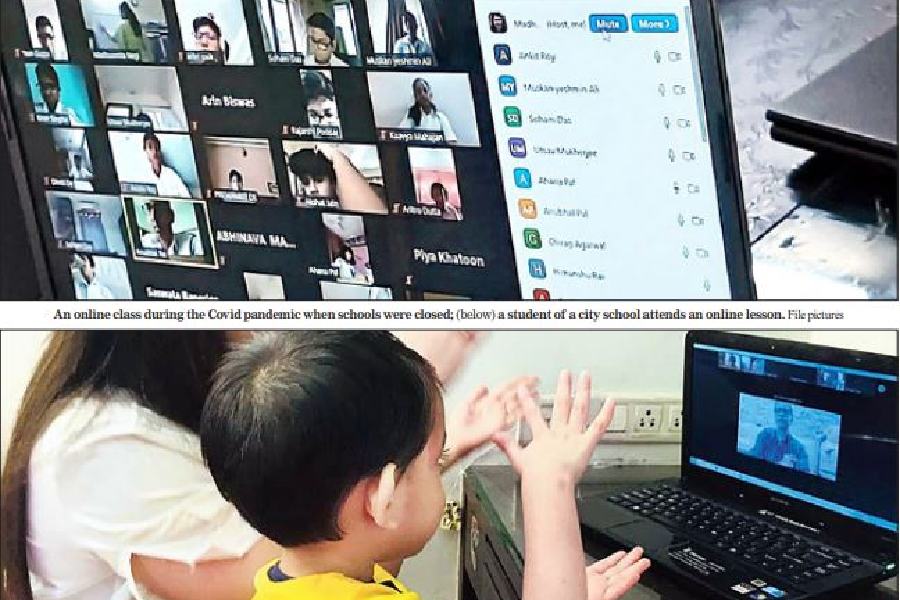Study on schools during peak Covid shows online class ‘harmed’ all sections of students


A study that covered three schools of varying profiles during the height of the Covid pandemic has shown that online classes negatively impacted all sections of students, from those struggling for basic access to those with resources.
The impact, too, was varying in nature depending on the profile of each school.
Simply being able to attend class was a problem for many because of the lack of a device at home. It denied them access to basic academic coursework — a problem mostly apparent in rural or semi-urban areas.
In the city, the lack of an emotional connection with the class and having to cope with the vagaries of a fickle Internet hurt students.
Between July 2020 and July 2021, the study was conducted by a Jadavpur University team that included vice-chancellor Suranjan Das and the late professor Samantak Das.
The team had picked three schools for their project — a rural government school with almost no access to devices, a privately-run school in Nadia district and an urban elite school in south Kolkata.
The findings of the study now form part of a larger pan-India exercise being funded by Anglia Ruskin University’s Global Research Fund in collaboration with Jadavpur University, Jamia Millia Islamia, Banaras Hindu University and NIEPA (The National Institute of Educational Planning and Administration).
The project is looking at the pandemic’s impact on access to education in India. That report is awaited.
“The sudden transition from face-to-face to online learning has shone a spotlight on the vast inequalities within the education system in Bengal and several other states. Inequalities in access to education were evident in Bengal in terms of the challenges faced in the capacity of teachers to quickly grasp an online delivery with sometimes very little or absolutely no digital infrastructure,” Sunrita Dhar Bhattacharjee, associate professor, school of management, Anglia Ruskin University, Cambridge, UK, told The Telegraph.
Dhar Bhattacharjee is the principal investigator for the larger project.
The JU team had separate discussions with teachers, principals and students in each school. They used a survey form that was distributed to teachers and some students in each school.
The findings varied in each school, depending on their location, the socio-economic status of students and the number of students in the school.
One thing was common in all three — the difficulty that faculty members faced in retaining students’ interest.
In one school, teachers said online teaching was inadequate because in a physical classroom communication happens through “non-verbal cues” as well.
All three schools spoke about the limitations of digital teaching methods.
The problems ranged from students’ inability to access devices owing to limited financial means to technicalglitches.
Some teachers spoke about the long waiting period for individual student responses, which took a significant chunk of class time each day. The escape from this would have been ignoring student responses altogether, which was well nigh impossible.
The study found that the faculty in each school tried to find ways to improve classroom engagement and sustain students’ interest.
Teachers in one school proposed showing informational videos and conducting interactive sessions with students to encourage engagement. But this, too, “is contingent on the student’s access to digital resources and a steady Internet connection”, the study says.
The absence of devices for many students made teachers in one school encourage them to team up with those in their class who had a phone at home to be able to attend lessons.
Those associated with the study said the rural-urban divide got further widened during the pandemic.
“Despite the sincerity of teachers in the government school, the divide between rural, semi-urban and urban, which already existed, got further entrenched during the pandemic,” JU VC Suranjan Das told The Telegraph.
“There was a lack of optimism, a sense of despondency about their aspirations among the students in rural and semi-urban schools. Whereas in the urban school, students still had aspirations to pursue,” he said.
Lower digital literacy and lack of access to the Internet were some of the challenges in rural areas.
“Even though online classes were being held, they failed to provide comprehensive education to all. The education gap has widened for students from poor economic households,” said Dhar Bhattacharjee.
VC Das said girls from underprivileged rural areas with limited access to devices suffered because of gender discrimination within their own families.
The survey found that if a family had one smartphone, the parents preferred to give it to the son more often than the daughter.
Students in one school shared with the survey team that they were instructed to turn on their video while writing an exam but if a screen froze or a connection dropped while navigating tabs to access questions, the teachers often assumed that the student was cheating.
“If screens automatically turned blank due to low bandwidth teachers assumed students were not at their desk or were disengaged from school work,” the study says.
Students of one school said they felt “burnt out, exhausted and overwhelmed with online learning and its demands on their time”.
They said besides back-to-back lessons for regular schoolwork, they had online meetings for extracurricular clubs and coaching classes to attend.
The study recommends addressing mental health issues among students.
“Despite government schemes in Bengal like giving tablets to students, or conducting classes through television, which were noteworthy, certain deficiencies emerged. The idea of such a survey is that the government can use the findings to adopt a long-term strategy so that students do not suffer in the future if there is any similar occurrence even if not a pandemic,” said Das.